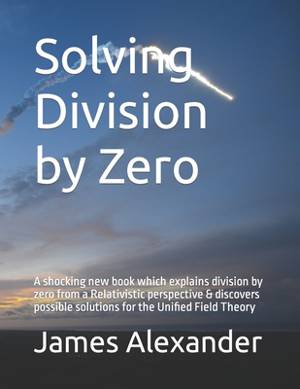
- Afhalen na 1 uur in een winkel met voorraad
- Gratis thuislevering in België vanaf € 30
- Ruim aanbod met 7 miljoen producten
- Afhalen na 1 uur in een winkel met voorraad
- Gratis thuislevering in België vanaf € 30
- Ruim aanbod met 7 miljoen producten
Zoeken
Solving Division by Zero
A shocking new book which explains division by zero from a Relativistic perspective & discovers possible solutions for the Unified Field Theory
James Alexander
€ 20,95
+ 41 punten
Omschrijving
James Alexander had been intrigued by impossible problems since childhood. He looks at the concepts of zero, infinity and the current number system from every angle possible - from its very beginnings as described in ancient Sanskrit texts to the field axioms in modern mathematics.Division by zero is currently specified as "undefined", because when you extrapolate the equations based on the results which can be found by alternative techniques, it results in seemingly "meaningless" corollaries like every number is equal to every other number.As science progressed over the past hundred years, we started using more and more sophisticated techniques to peer into the sub atomic world. The deeper we looked, the more we found and the search continues for the elusive fundamental building block of nature. Today with an electron microscope, it is possible to take a photo of individual atoms. Where "nothing" was thought to exist before, today we know about the existence of atoms, electrons and protons.How can we say that we understand the concept of "nothing", when we have not yet been able to find the fundamental building blocks or nature? There is something we can't yet find, underneath the fabric of reality - that is what physics tells us. We know of the existence of black holes which are so dense that it contains more mass than the largest stars in existence. We cannot even imagine the total size of our planet, never mind the sun, or the myriad of super stars larger than the sun. These are entities which exist in the realm of "infinity" in terms of numbers which are so large as to be hard to understand or reach. We know that the laws of nature do not seem to work within the event horizon of these black holes. A black hole is the nearest physical entity we have to something which is "infinite". Considering we cannot even make sense of a physical entity which has more mass than anything we can possibly imagine; how can we say that we understand the concept of infinity?Mathematics defines a number line starting from zero and ending in Infinity, at a time when humans did not even partially understand the concept or zero (nothing) or infinity (a very large number which we cannot quantify). This is why they seem like meaningless equations - not because they are meaningless, but because we did not fully understand these concepts when we defined them, and started using them in mathematics.When we use concepts, we do not fully understand in science, they may in certain scenarios produce results, we do not fully understand or may seem as nonsense. This does not mean that they are nonsense, it could mean that we do not understand them because of the flaws in our understanding of these concepts, and as you will see in this book, it may also mean that, the equations do make sense, when we look at them from a different perspective, which is beyond that of human intuition - because we see missing variables which can fill in the blanks, to make nonsense make sense.We took concepts which were well beyond our ability to understand at the time (and still don't - as this book will explain) and placed them on either side of the number line. We then defined our number system somewhere in between. Then, we used them concepts in an equation, and arrived at some corollaries - why would it make any sense to us? - why would it be easy to understand?Eyed through the lens of a purely scientific, unbiased approach, things which made no sense before, now starts to make perfect sense. What seemed to be nonsense before, now is perfectly sensible and logical. For the first time ever, explained in excruciating detail, with innumerable, painstaking references from many, many obscure physicists and mathematicians who glimpsed at portions of the truth without quite getting there, this book will change the way you look at mathematics & physics, forever.
Specificaties
Betrokkenen
- Auteur(s):
- Uitgeverij:
Inhoud
- Aantal bladzijden:
- 54
- Taal:
- Engels
- Reeks:
- Reeksnummer:
- nr. 1
Eigenschappen
- Productcode (EAN):
- 9798631777132
- Verschijningsdatum:
- 29/03/2020
- Uitvoering:
- Paperback
- Formaat:
- Trade paperback (VS)
- Afmetingen:
- 216 mm x 280 mm
- Gewicht:
- 195 g

Alleen bij Standaard Boekhandel
+ 41 punten op je klantenkaart van Standaard Boekhandel
Beoordelingen
We publiceren alleen reviews die voldoen aan de voorwaarden voor reviews. Bekijk onze voorwaarden voor reviews.











